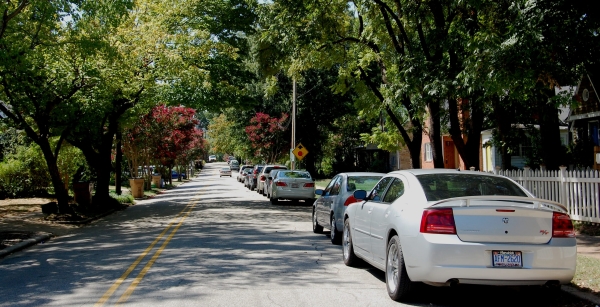More North Carolina State University students are living off-campus and some residents of Southwest Raleigh aren’t happy about it.
The group presented concerns — crowded streets, scarce parking and declining property values — to Raleigh Planning Director Mitchell Silver in a recent community meeting hosted by District D City Councilor Thomas Crowder.
N.C. State’s enrollment now stands at 34,000 students. Centennial Campus also hosts 4,000 private business employees, faculty and staff members and 600 middle school students.
Those higher enrollment numbers have increased demand for on-campus housing. But even when housing is available, students increasingly choose not to live in traditional dorm rooms, where shared bedrooms and common quarters are the norm.
Compared to 20 years ago, 90 percent of college freshman have never shared a bedroom. N.C. State University plans to build more on-campus designed to meet their needs, but no immediate relief is in sight.
Raleigh’s attempts to guide development closer to the university include zoning the areas near main and Centennial campuses as high density, but nothing compels private developers to choose the location.
Neighbors fear student-oriented developments farther away from campus will increase traffic and parking on already crowded streets and destroy the character of existing neighborhoods.

Cars fill the street parking in a neighborhood near NCSU.
What the City Can (and Can’t) Do
Ordinances to control the number of unrelated persons sharing a home space have been met with legal challenges in other communities. Even if the legal field was clear, such ordinances would also effect elderly housing or households where immigrants share rooms to reduce housing costs.
Since student housing is not a zoning category, Silver has instructed planning staff to meet with the city’s attorneys to research actions the city can legally take, including adopting best practices from other university towns such as Nashville’s university overlay districts.
Zoning has had some effect on Centennial’s future housing plans. In 1988, university officials agreed that one-third of Centennial’s nine million square feet would be residential. But the units are expected to be a combination of student housing and units for rent or for sale, according to Michael Harwood, associate vice chancellor for the Centennial Campus development office.

Students cross busy Hillsborough Street between classes.
University Housing Plans
Some relief is coming. University Housing Associate Director Jim Pappenhagen said additional apartment style housing on Centennial is coming soon. Phase One, due to open in the fall of 2013, will house 500 to 600 students and Phase Two, due to open in fall 2014, will accommodate another 550 students. On the main campus, university officials plan to replace two residence halls. The Greek Village also plans to add town homes.
Hardwood said more Centennial housing is in the works, but not all of it will be designed with students in mind.
The Greens at Centennial Campus will be a collaboration between the university and Capital and Associates, a private developer, that will add 280 one- and two-bedroom apartments designed for young professionals. The preliminary site plan will be submitted to Raleigh in the next two to three weeks, Harwood said.
Another mixed-use development with retail and residential units is planned for the area between Lake Raleigh and the new Hunt library in future years.
Students may live in either project, but the rents will be higher than most student housing options.
Private Development
Meanwhile, private development isn’t always the perfect answer, according to community activist and former city council member Anne Franklin.
The Raleigh 2030 Comprehensive Plan zones the areas near campus as high density as a way to guide development near the university, but nothing prohibits developers from building farther away.
“Some want to explore developing student housing at a distance from the campus with no accommodations for transportation, no library, no associated services or amenities,” Franklin said. “So essentially, anyone who lived there would have to operate a car. Even if you solved the transit issue, it still leaves a lot of trips.”
Jason Hibbets, chair of Raleigh’s South West Citizen Advisory Council, uses the planned Lineberry Student Housing project on Lake Wheeler Road as an example of a missed opportunity to meet both student and community needs.
“The site could have provided retail opportunity to the community in addition to providing housing opportunities for new residents,” he said.
As Franklin said, “Dense housing should be placed where that location is a destination, with things to do, places to live and places to shop. If you stick out in the middle of nowhere, it only gives people a place to live; it does not give them a place for a life.”
